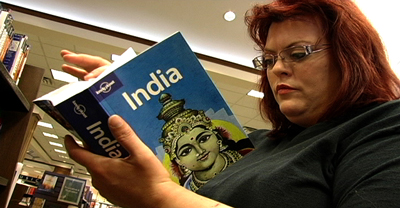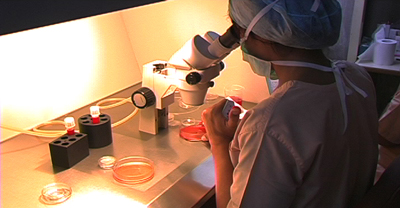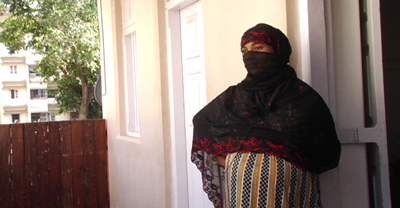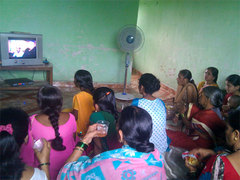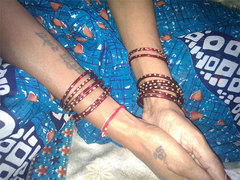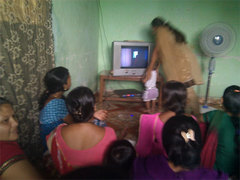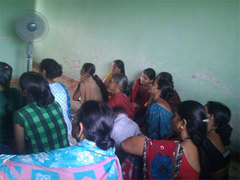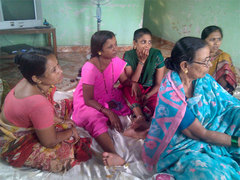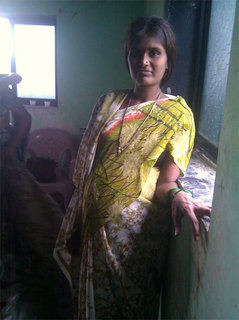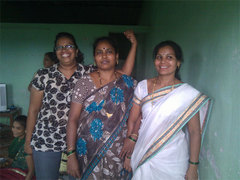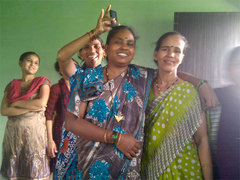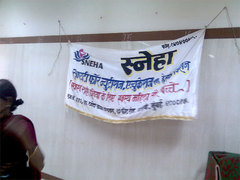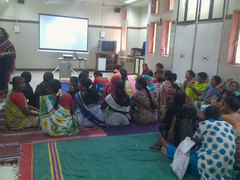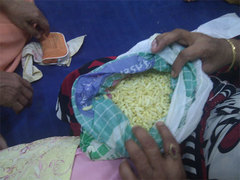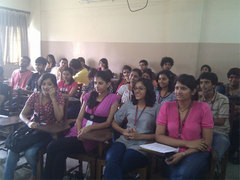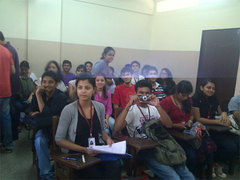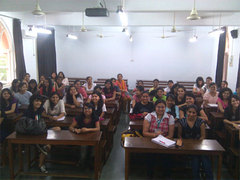There are very few groups currently working on highlighting surrogate voices within India despite the fact that a business continues to boom without any regulations. In 2011, Made in India received a grant from The Fledgling Fund to create a Hindi Dub of the film. This and the Original Version of Made in India are currently being used by our partner organizations/individuals along with the filmmakers to educate and raise awareness about health and rights issues related to commercial surrogacy in India.
Below are a few quotes and photos from the most recent series of screenings in India (August - September 2011). To access the most recent copy of the suggested guidelines for drafting surrogacy laws in India (under review at the Parliament), please visit this website. To ask for a copy of the critique of these recent guidelines, visit Sama.
If you’re interested in hosting a community screening, please contact us here: info@madeinindiamovie.com
Screening of Made in India in outskirts of Mumbai hosted by surrogates and organized in collaboration with Daisy Deomampo and Prachi Bari
Reactions The conversation was primarily about rights. The surrogates and agents’ major concerns are that of being ostracized and losing their jobs if they decide to make demands. The film was an excellent springboard to allow the surrogates and agents to openly discuss questions of the rights and health within the context of their work. It also allowed them to discuss Aasia’s (surrogate and film’s character) situation and describe their own experiences in a safe environment. Below are some quotes from the conversation:
Surrogate 1: “I feel bad for the troubles that the couple had to go through.”
Surrogate 2: “I feel worse for the surrogate for the trouble she had to go through.”
(Surrogates viewing film, and discussing their own challenges post-screening.)
(A first time surrogate carrying twins at 7 months)
Surrogate 3: “In one instance of miscarriage in the 6th month, the woman only received 5000 rupees. We should receive payment upon miscarriage.”
Surrogate 4: “We receive Rs. 25000 ($550 USD) more for twins.
Surrogate 5: “We sign the contract but nobody reads it to us. And if there’s a literate person in the room, they ask them to wait outside.” “They (clinic) say if you don’t want to sign then we’ll find somebody else. But I am majboor (compelled by my situation).”
Surrogate 6: “We speak to the couples but only with the doctors around.”
Surrogate 7: “We want agents to come together for laws.”
(Prachi Bari with Sunanda (in blue), a recruiting agent and previously a surrogate. Sunanda is surrounded by other surrogates and egg donors.)
Sunanda’s College going daughter (age 15): “I don’t have a problem with my mother being a surrogate, she’s not a criminal. (But) I don’t want to be a surrogate.”
Previous surrogate/current agent: “Once my friend and I stood up for one of our surrogates but we were looked at as difficult by the clinic and our job was almost compromised. But currently we have a surrogate friend who is going through a problem and we have told her that we will stand behind you if you need to go to the police.”
Agent: “Once a surrogate’s father was seriously ill but her hospital would not let her leave the surrogacy hostel saying that it would be against the contract. She was 6 months pregnant and threatened to “drop” her baby. They finally let her leave for a few weeks to see her father.”
SNEHA in collaboration with Point of View, organizes a community screening of Made in India in Dharavi, Mumbai
In collaboration with partner organizations Point of View and SNEHA, Made in India was screened for women in the community of Dharavi, one of Asia’s largest slums and home to a large informal labor market in India. The result was a varied number of women interested in the film from several perspectives including domestic violence, family structure, motherhood and livelihood.
Reactions
Woman 1: It was really sad how Aasia (the surrogate) had to struggle to get paid fairly.
Woman 2: “I can’t believe an Indian woman would do this.”
Woman 5: “Would a woman there (West) give away her child?”
Woman 3: “The surrogate’s relationship with her husband must not have been great to begin with, why else would she choose to do this (surrogacy)?”
Woman 4: “I wonder if their sex life was back to normal after the pregnancy.”
Woman 6: “Only a mother can do this for her children. A mother’s determination is strong.
(Women sharing rice puffs as snacks during the screening)
University screenings in collaboration with Point of View, Mumbai
Made in India screened at several Universities in Mumbai and New Delhi, followed by a lively and engaging conversation with students and teachers.
IIT, New Delhi (In collaboration with Anindita Majumdar)
Student: “Congratulations… for bringing out this much untouched issue “surrogacy” which is becoming more of a business in India and seriously needs laws than just guidelines. I think you have done a wonderful job by not inclining towards any side. Thanks!”
Whistling Woods International, Film School, Mumbai
Student: “When the situation with the hospital got tense, the high frustration was apparent and yet everyone’s commentary remained diplomatic.” “How long do you think it will take to get governments to regulate this industry enough to protect the rights of surrogate mothers/biological parents?”
St. Xavier’s College, Mumbai
Bachelor of Mass Media Student 1: “What happens in case of a breach of contract?”
Student 2: “Who makes sure that the clinics are ethical?”
SNDT Women’s College, Mumbai
Student: “Can a lesbian woman practice surrogacy?”
Sophia’s College, Social Communications Media, Mumbai
Student 1: “I do not think this practice should take place, it is disturbing.”
Student 2: “I think I’m ok with it but there needs to be adequate protection for the surrogate.”





